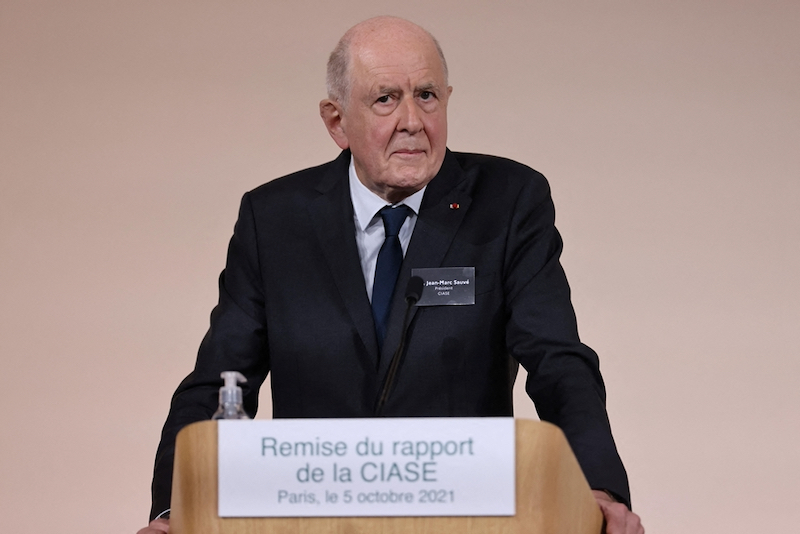At least 330,000 people have been sexually abused in the Catholic Church in France since 1950, according to the long-awaited independent report on the scandal.
The report says that 216,000 people were sexually abused by clerics and another 114,000 by lay people in Church-related functions such as catechists and school teachers.
The 485-page report, which Church leaders had already warned would contain “shock waves”, estimates about 3,000 priests were aggressors but said the total was probably higher because all cases were not known.
Archbishop Éric de Moulins-Beaufort, president of the bishops’ conference, apologised to the victims after receiving what he described as a “tough and severe” report, that he received from the head of the inquiry, former senior civil servant Jean-Marc Sauvé.
“I express my shame, my fear, as well as my determination to act so that the refusal to see, to hear, the will to hide or conceal, the reluctance to publicly denounce them disappears,” he said at the presentation.
Sister Véronique Margron, head of the Conference of Religious of France, said the report was “a disaster”.
The French bishops commissioned the report in 2018 after abuse scandals, especially one that rocked Lyon archdiocese and led to the resignation of Cardinal Philippe Barbarin as the city’s archbishop, led to mounting public pressure to finally face reality.
Sauvé assembled a team of 21 experts – men and women, Catholics and non-Catholics, no clerics – and interviewed victims, consulted specialists and combed Church and civil archives around France for the report. A further 2,500 pages of annexes accompanied the separately bound report.
The estimates of victims came from statistical studies by the French National Institute of Health and Medical Research and the polling institute IFOP.
While Sauvé stressed that sexual abuse occurred in other institutions dealing with children, he said the Catholic Church in France led the list, ahead of summer camps, public schools or sports clubs. Some 80 per cent of the victims of clerical sexual abuse were boys, mostly between 10 and 13 years old.
He said just over half of Church abuse cases occurred between 1950 and 1969. They fell progressively between 1970 and 1990, a period when vocations to the priesthood and Church influence also dropped, and then hit a plateau that persists until today.
“It’s a mistake to say the problem is behind us. No, the problem persists,” said Sauvé, who recently admitted he needed psychological help after hearing testimonies of some victims.
The former judge said the Church showed “a profound and total, even cruel, indifference to the victims” until about the year 2000. It then announced a policy of “zero tolerance” but did not effectively apply it.
The real change came about 2015 when the scandal surrounding Bernard Preynat, the now-former Lyon priest and serial abuser kept in ministry by Cardinal Barbarin, hit the national headlines.
The report makes 45 recommendations, including “a recognition of the responsibility of the institution”. Canon law must change to classify clerical sexual abuse as a crime against the victim’s dignity rather than a violation of celibacy. The bishop’s religious and juridical functions should be separated.
Priests should have to report confessed abusers to the police rather than keep the secret of the confessional, the report adds.
The Church should compensate victims according to the severity of the crimes not by a flat fee as the bishops proposed. “Compensation cannot be a gift. It is due to them, they have a claim,” Sauvé said. Certain charisms had been “diverted”, he noted, a reference to abuse by leaders of some Church communities.
Priestly authority has been inflated by “an excessive sacralisation and the identification of the priest with Christ in all aspects of his life”, the life-long Catholic added. The discernment and formation of seminarians must be improved.
Church governance has often hindered the uncovering of abuse so lay Catholics should be included in disciplinary decisions. There should also be written annual appraisals of priests to provide a record if needed.
Before the report was presented, the founder of the victims’ association La Parole Libérée that unveiled abuse in Lyon archdiocese, thanked the commission for its work but blasted the Church.
“The institution is totally dysfunctional, the system is deviant. There are no reliable safeguards,” François Devaux said. “Reform needs to be so broad and so deep that a Vatican III can only be a stopover along the way.”



 Loading ...
Loading ...